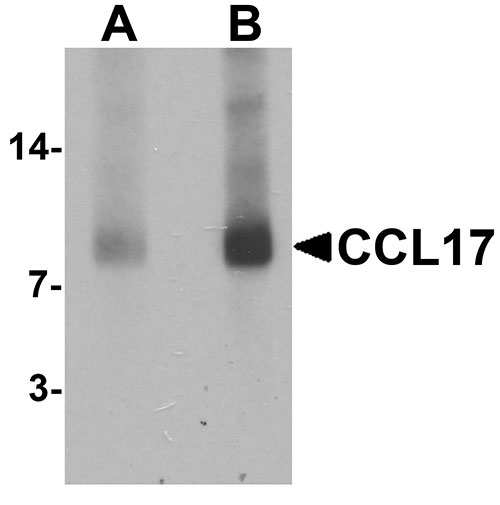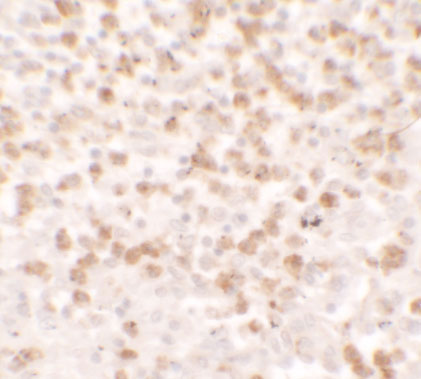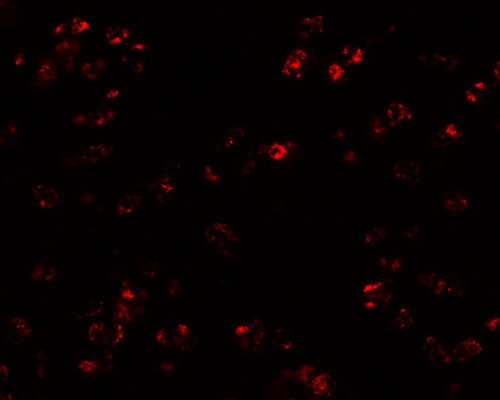CCL17 Antibody
- SPECIFICATION
- CITATIONS
- PROTOCOLS
- BACKGROUND

Application
| WB, IHC-P, IF, E |
|---|---|
| Primary Accession | Q92583 |
| Other Accession | NP_002978, 4506829 |
| Reactivity | Human, Mouse, Rat |
| Host | Rabbit |
| Clonality | Polyclonal |
| Isotype | IgG |
| Calculated MW | 10 kDa |
| Application Notes | CCL17 antibody can be used for detection of CCL17 by Western blot at 1 - 2 µg/mL. |
| Gene ID | 6361 |
|---|---|
| Target/Specificity | CCL17; |
| Reconstitution & Storage | CCL17 antibody can be stored at 4℃ for three months and -20℃, stable for up to one year. |
| Precautions | CCL17 Antibody is for research use only and not for use in diagnostic or therapeutic procedures. |
| Name | CCL17 |
|---|---|
| Synonyms | SCYA17, TARC |
| Function | Chemokine, which displays chemotactic activity for T lymphocytes, preferentially Th2 cells, but not monocytes or granulocytes. Therefore plays an important role in a wide range of inflammatory and immunological processes (PubMed:8702936, PubMed:9169480). Acts by binding to CCR4 at T-cell surface (PubMed:9169480, PubMed:10540332). Mediates GM-CSF/CSF2-driven pain and inflammation (PubMed:27525438). In the brain, required to maintain the typical, highly branched morphology of hippocampal microglia under homeostatic conditions. May be important for the appropriate adaptation of microglial morphology and synaptic plasticity to acute lipopolysaccharide (LPS)-induced neuroinflammation (By similarity). Plays a role in wound healing, mainly by inducing fibroblast migration into the wound (By similarity). |
| Cellular Location | Secreted |
| Tissue Location | Constitutively expressed in thymus. Detected at lower levels in the lung, colon and small intestine (PubMed:8702936) Expressed in stimulated peripheral blood mononuclear cells, but not in resting cells (PubMed:8702936). |

Thousands of laboratories across the world have published research that depended on the performance of antibodies from Abcepta to advance their research. Check out links to articles that cite our products in major peer-reviewed journals, organized by research category.
info@abcepta.com, and receive a free "I Love Antibodies" mug.
Provided below are standard protocols that you may find useful for product applications.
Background
CCL17 Antibody: CCL17, also known as TARC, binds to chemokine receptors CCR4 and CCR8 and plays important roles in T cell development in thymus as well as in trafficking and activation of mature T cells. CCL17 is secreted from monocyte-derived DCs and endothelial cells and is responsible for selective recruitment and migration of activated Th2 lymphocytes. CCL17 is also required for CCR7 and CXCR4-dependent migration of cutaneous dendritic cells under inflammatory conditions.
References
Imai T, Baba M, Nishimura M, et al. The T cell-directed CC chemokine TARC is a highly specific biological ligand for CC chemokine receptor 4. J. Biol. Chem. 1997; 272:15036-42.
Bernardini G, Hedrick J, Sozzani S, et al. Identification of the CC chemokines TARC and macrophage inflammatory protein-1 beta as novel functional ligands for the CCR8 receptor. Eur. J. Immunol. 1998; 28:582-8.
Alferink J, Lieberam I, Reindl W, et al. Compartmentalized production of CCL17 in vivo: strong inducibility in peripheral dendritic cells contrasts selective absence from the spleen. J. Exp. Med. 2003; 197:585-99.
Stutte S, Quast T, Gerbitzki N, et al. Requirement of CCL17 for CCR7 and CXCR4-dependent migration of cutaneous dendritic cells. Proc. Natl. Acad. Sci. USA 2010; 107:8736-41.
If you have used an Abcepta product and would like to share how it has performed, please click on the "Submit Review" button and provide the requested information. Our staff will examine and post your review and contact you if needed.
If you have any additional inquiries please email technical services at tech@abcepta.com.













 Foundational characteristics of cancer include proliferation, angiogenesis, migration, evasion of apoptosis, and cellular immortality. Find key markers for these cellular processes and antibodies to detect them.
Foundational characteristics of cancer include proliferation, angiogenesis, migration, evasion of apoptosis, and cellular immortality. Find key markers for these cellular processes and antibodies to detect them. The SUMOplot™ Analysis Program predicts and scores sumoylation sites in your protein. SUMOylation is a post-translational modification involved in various cellular processes, such as nuclear-cytosolic transport, transcriptional regulation, apoptosis, protein stability, response to stress, and progression through the cell cycle.
The SUMOplot™ Analysis Program predicts and scores sumoylation sites in your protein. SUMOylation is a post-translational modification involved in various cellular processes, such as nuclear-cytosolic transport, transcriptional regulation, apoptosis, protein stability, response to stress, and progression through the cell cycle. The Autophagy Receptor Motif Plotter predicts and scores autophagy receptor binding sites in your protein. Identifying proteins connected to this pathway is critical to understanding the role of autophagy in physiological as well as pathological processes such as development, differentiation, neurodegenerative diseases, stress, infection, and cancer.
The Autophagy Receptor Motif Plotter predicts and scores autophagy receptor binding sites in your protein. Identifying proteins connected to this pathway is critical to understanding the role of autophagy in physiological as well as pathological processes such as development, differentiation, neurodegenerative diseases, stress, infection, and cancer.




